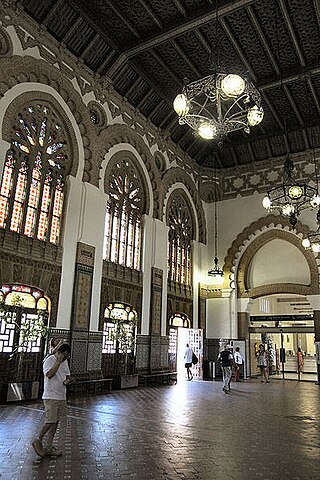See also
- Chicho, Spanish nickname sometimes used for people called Narciso
Narciso may refer to:
Fernando is a Spanish and Portuguese given name and a surname common in Spain, Portugal, Italy, France, Switzerland, former Spanish or Portuguese colonies in Latin America, Africa, the Philippines, India, and Sri Lanka. It is equivalent to the Germanic given name Ferdinand, with an original meaning of "adventurous, bold journey".
Filipinos have various naming customs. They most commonly blend the older Spanish system and Anglo-American conventions, where there is a distinction between the "Christian name" and the "surname". The construct containing several middle names is common to all systems, but having multiple "first" names and only one middle and last name is a result of the blending of American and Spanish naming customs.
Claveria is the name of three municipalities in the Philippines named after Narciso Clavería, the Spanish Governor-General of the country from 1844 to 1849.

The Catálogo alfabético de apellidos is a book of surnames in the Philippines and other islands of Spanish East Indies published in the mid-19th century. This was in response to a Spanish colonial decree establishing the distribution of Spanish family names and local surnames among colonial subjects who did not have a prior surname. It is also the reason why Filipinos share some of the same surnames as many Spaniards and other Hispanic countries. Among Filipinos, a Spanish surname does not necessarily imply Spanish ancestry.
Guerra is a Portuguese, Spanish and Italian term meaning "war". Notable people with the surname Guerra include:
Elvira is a female given name. First recorded in medieval Spain, it is likely of Germanic (Gothic) origin.
Paloma is a Spanish female given name, derived from Latin "palumbus", which means "dove", a symbol of peace. The name also can be understood as the Holy Spirit symbolized in this bird. Palomma, using double "m", comes from a Neapolitan dialect, made famous in the song "Palomma 'e notte" written by Di Giacomo and Buongiovanni in 1906.
Renatus is a first name of Latin origin which means "born again". In Italian, Portuguese and Spanish it exists in masculine and feminine forms: Renato and Renata. In French they have been translated to René and Renée. Renata is a common female name in the Czech Republic, Croatia, Lithuania, Poland and Slovakia. The feminine Renate is common in German, Dutch and Norwegian. In Russia the names Renat and Renata are widespread among the Tatar population.
Pimentel is a Portuguese and Spanish surname, held in part by members of the House of Pimentel, a Spanish noble family of Portuguese origin and established in the Kingdom of Castile. Pimentel denotes pepper plants and spices, suggesting an occupation or a location as the origin of the name.

The Balanguingui Expedition of 1848 was an amphibious campaign organized by Governor General Narciso Clavería y Zaldúa to capture Balanguingui Island in the Sulu Archipelago from the Moro Pirates, who were using it as a base for their piratical activities.

Narciso José Anastasio Clavería y Zaldúa was a Spanish army officer who served as the Governor-General of the Philippines from July 16, 1844, to December 26, 1849.
Narciso Clavería may refer to:
Del Rosario, in Spanish and Italian languages, and do Rosário in Portuguese language is a surname that has as its etymology, the Latin preposition, "de" meaning "of the" and the Latin noun "rosarium", meaning "rosegarden" or "garland of roses" but in this case, takes the meaning of "rosary", the Roman Catholic devotion to the Virgin Mary. In fact, its origins are from the Middle Ages, around the 12th century, and it is much associated with the cult of the Virgin Mary at the time when the rose became part of the holy aura, which surrounded anything to do with Mary, and the Our Lady of the Rosary's Feast of the Holy Rosary. This surname is common in Romance languages regions, and is also one of the most common surnames in the Philippines and other islands of Spanish East Indies since the mid-19th century, and where it is one of the most popular clans together with Cruz, Santos, Reyes, Gonzales, Bautista, García, Mendoza, Aquino, and others, because there are so many people that have this surname.

Narciso Clavería y de Palacios (1869–1935) was a Spanish architect, notable as an exponent of the Moorish revival style known as Neo-Mudéjar. He was the grandson of Narciso Clavería y Zaldúa, a nineteenth-century Governor General of the Philippines from whom he inherited the title of Count of Manila.
Buenvenida is a variation of the Spanish word bienvenida, feminine form of bienvenido, which literally means "welcome." According to the Catálogo alfabético de apellidos, a document of surnames published in the Philippines and other islands of Spanish East Indies in the mid-19th century, the name has also been adopted by locals in the Philippines. This was in response to a Spanish colonial decree establishing the distribution of Spanish family names among the inhabitants of the Philippines who did not already have a surname.
Gregorio is a masculine given name and a surname. It may refer to:
Zaldúa is a surname. Notable people with the surname include:
Benito is the Spanish form of Benedict and is both a masculine given name and a surname. Notable people with the name include:
Count of Manila is a Spanish hereditary title created in 1848 for Narciso Clavería y Zaldúa, Governor-General of the Philippines.
Feliciano is a Spanish, Portuguese, and Italian name. Notable people with the name include: